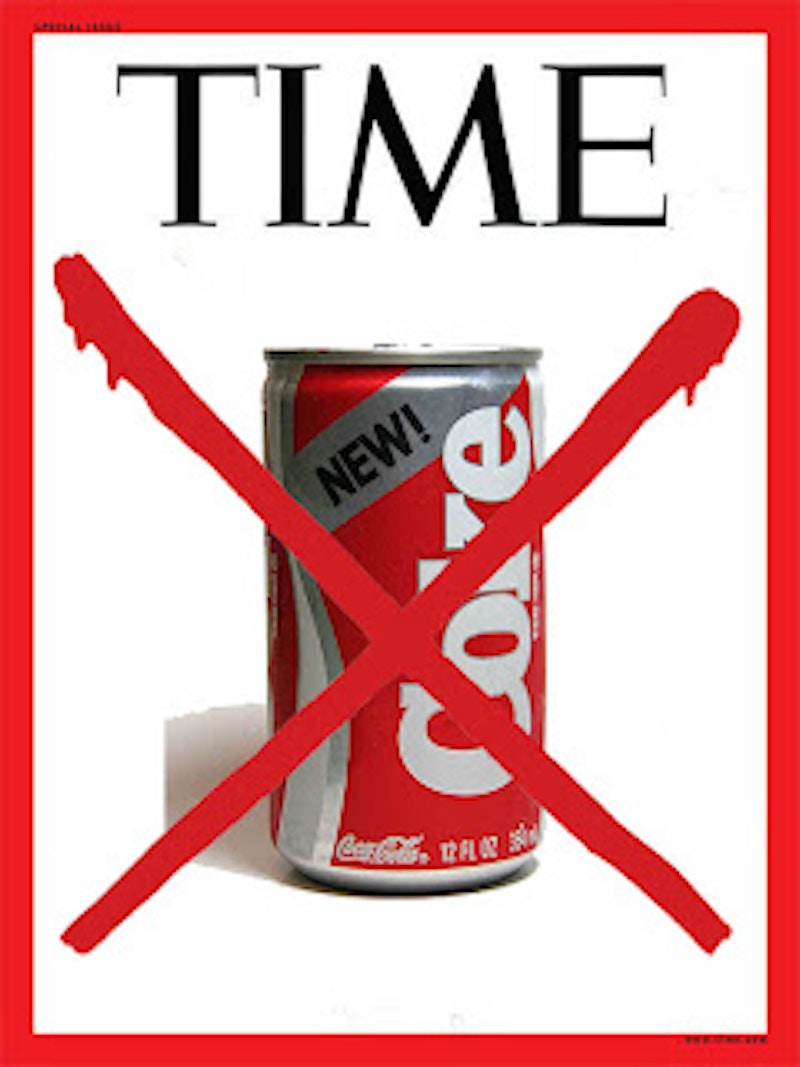One of the more curious American late-20th century cultural events was the introduction and subsequent removal of New Coke from store shelves in 1985. I remember thinking, “Interesting, the Coca-Cola company is committing suicide,” Why did they do it? “Old Coke” had, through years of TV commercials, jingles and billboards, established itself as the ideal representation of everything good about America. It didn’t discriminate, it was available to all and it crossed social and class boundaries. And now it was gone. There was widespread public outcry and Old Coke was reintroduced. This led me to realize that the change in form of certain products is more than a business decision; there are metaphysical questions at play. People orient themselves towards existence in their product choices and if the products change there’s a corresponding change in their mental alignment.
It’d been drummed into our heads that Coke was “The Real Thing” and now, they’d changed it. By definition whatever followed could no longer be The Real Thing, but only a false substitute. The iron bond between the Coca-Cola Company and the American public was broken. Coke was revealed not as an unchangeable cultural reality but simply a product, subject to market analysis, boardroom decisions and profit curves. This was a breach of faith. You can knock down Confederate Statues, you can rename football teams, you can exorcise words from the language but some things you don’t touch.
In our lives, as in our product choices, logic often bends before hope and desire. People know Coke is bad for them; its downside is a matter of public record. Each serving has the equivalent of 10 teaspoons of sugar, it’s acidic and rots your teeth, regularly drinking Coke or any cola-type beverage can cause cancer and diabetes; in fact Coke has no redeeming qualities except that people like it.
The billionaire investor Warren Buffett noticed the public reaction to New Coke and the brand loyalty of its consumers and immediately bought as many shares as he could. It became a cornerstone of the Berkshire Hathaway Portfolio. Then, Old Coke came back yielding Buffett and his shareholders a fortune. I can only imagine what happened to whoever it was who first suggested New Coke. He’s probably still chained to the wall in the Coke Headquarters basement on a bread-and-Pepsi diet.
There are cultural realms however where “the new” is welcomed, even obligatory. I worked in a hi-fi store and saw that every year each product was suddenly ”new and improved.” Customers expected this in audio equipment, whether because they’d been well-trained as consumers or because of some innate belief in the miracle of engineering progress. When the magic formula “This is the new model” was intoned, I could see the look of hope and belief in the customer’s eyes. Usually these changes were cosmetic, typically from flat to glossy in the finish of the unit’s casing. But it was clear that hearing those words heightened the anticipation of their listening experience; it gave them the certitude of passing quality time. But this wasn’t the case with New Coke.
I believe there will come a day when people stop drinking Coke altogether. It may be happening now. It won’t be simply because of health concerns, but some other, more mysterious shift in the public consciousness. Coke will no longer mean anything to them, so they’ll stop buying it. In the 19th century, the favorite drink in America by far was whiskey. It was cheaper than coffee. People also enjoyed minstrel shows and animal blood sports like bear-baiting and cock-fighting. It’s hard to imagine today. What about football, baseball, rock and rap music, TV series, Disneyland? Could these disappear as well? Given time, it’s probable.

